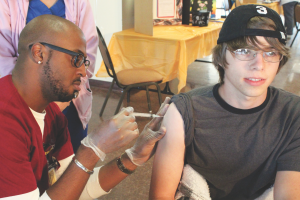 Multiple options are available for individuals seeking flu shots as flu season starts.
Multiple options are available for individuals seeking flu shots as flu season starts.
A relatively new flu vaccination is the intradermal flu vaccine. This intradermal vaccine is injected into skin instead of muscle, according to the United Sates Centers for Disease.
The vaccine uses a needle that is 90 percent smaller than normal flu shots and is therefore recommended to people with aversions to needles.
The intradermal vaccine still protects against the season’s three most common flu viruses, and it works the same way in the body as other flu vaccination options.
The intradermal is approved for ages 18 to 64. Side effects include redness, swelling, toughness, pain and itching where it has been injected.
Besides pain, these effects are actually more common with this vaccine than the normal flu shot.
Yolanda Camper, nurse practitioner at the ULM Health Clinic, said the clinic does not currently offer the intradermal flu vaccine though other local Affinity clinics have them available.
The intradermal flu vaccine might be offered at the campus clinic in the future depending on availability. The on-campus clinic uses a quadrivalent vaccine that defends against four types of the flu virus.
Camper said that once people suffer from the flu, they usually vow to never go without a flu shot again. Though she advises everyone to get vaccinated, she said high-risk patients “should definitely get a flu shot.”
Camper also said flu vaccinations are important for those in a highly populated place such as a university.
She said the fear of getting the flu from a flu shot is unwarranted as most flu vaccines use an inactivated form of the virus that is not infectious.
Though the intranasal spray uses live viruses, they are weakened to the point where they cannot cause the flu.
The ULM Health Clinic offers the flu vaccine until June. The vaccines don’t expire until six months into the next year. As the Ebola virus becomes prominent in current news, Camper said flu vaccinations have “taken a backburner.”
She said though it is “a very tragic virus,” people should become vaccinated for what they can already protect themselves against including the flu.
Monroe has already had multiple cases of the flu this season.
Though flu seasons change from year to year, these cases predict a certain pattern for this year’s flu season.
“Early cases are indicative of a severe flu season,” Camper said.
Emily Helmick said she has not gotten a flu shot yet but is planning to get one soon. Her preference is the common flu shot with the regular size needle.
“I work at a clinic and I’m sure they
want me to be immunized,” said Helmick, a senior healthcare and marketing major.
Other students hesitate to get the flu shot for various reasons.
Krystal Bacle receives a flu shot each year. She said she understands why people might choose not to get vaccinated.
“I can understand that some people are scared of needles or pass out when they get injections,” said Bacle, a freshman finance major.








